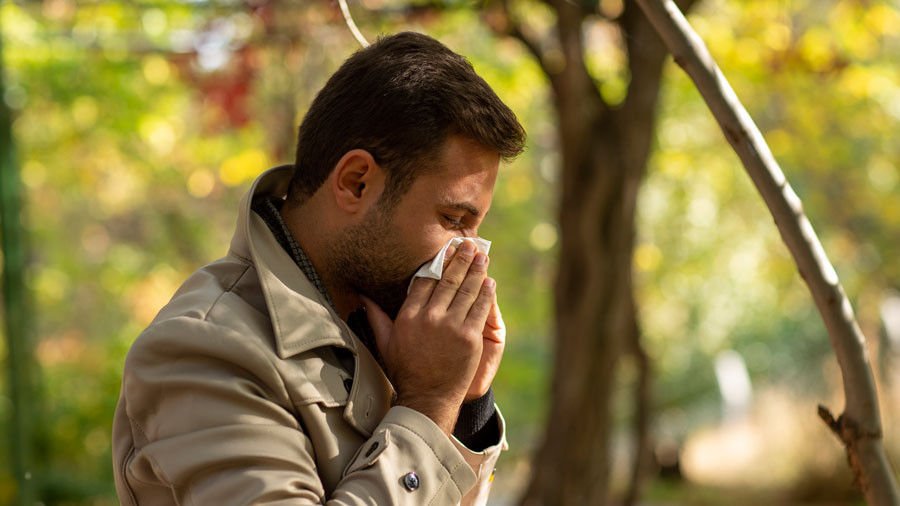While the second wave of Covid-19 left many gasping for breath, the third wave brings with it the unpleasant sensation of overstuffed and blocked nose and throat. This uncomfortable feeling of congestion is caused when the body produces excessive amounts of sticky mucus to fight off the infection. We cough, sneeze and wheeze to open clogged passages. However, too much coughing and sneezing leaves us annoyed, irritated and tired. Hence, we need to find ways to get rid of the snot.
Is mucus a bad thing?
First, we need to understand what mucus is and what role it plays. Mucus is a gel-like substance that lines our nose, throat, mouth, sinuses and lungs. The membranes of the nose and sinuses, to protect and support the respiratory system, produce it. The digestive system, the cervix, and the urinary tract also make it.
It is not only produced when you are fighting flu or cold, it’s always around, you don’t notice it.
When we are healthy, the mucus is of thinner consistency and less sticky, so we don’t feel it stuck in our nose or throat. Mucus can prevent you from falling sick, its main function is to trap bacteria, allergens, and viruses and prevent them from spreading to other parts of our body. Mucus also contains antibodies that can kill and neutralise harmful substances in the airways. It has an important role in your lung’s immune response because it traps irritants — smoke, germs, dust and chemicals in your airways and allows your body to expel them through coughing. This helps protect you from infection.
When you fall sick, the mucus may become thicker or stickier. It may build up in our lungs and throat, causing congestion. It may also cause difficulty swallowing. In severe cases, mucus can collect in your airways and make breathing more difficult and increase your risk of infection.
If you have an infection, the colour and consistency of mucus may change.
Yellow or greenish colour: The colour is due to neutrophils (white blood cells), which your body produces to fight an infection. So a yellow or greenish colour means you have an infection.
Red or brown colour: This is often a sign that there’s blood in your mucus. This is caused when the tissues lining the nasal cavity become dry. Frequent blowing your nose, wiping and rubbing can lead to irritation of the nasal lining and cause minor bleeding.
Clear mucus: It is a symptom that you’re getting allergies and your body is trying to remove irritants like pollen or dust.
Thick mucus: It is perhaps an indication of very dry mucous membranes. This may be a result of dehydration, smoking, and a hot dry indoor environment due to air-conditioning or heating.
Superhero foods
If you have a persistent cough and find it difficult to expel mucus, you can supplement your prescribed medicines with certain foods that can help get rid of the unpleasant sensation. Try to include these foods to alleviate your symptoms…
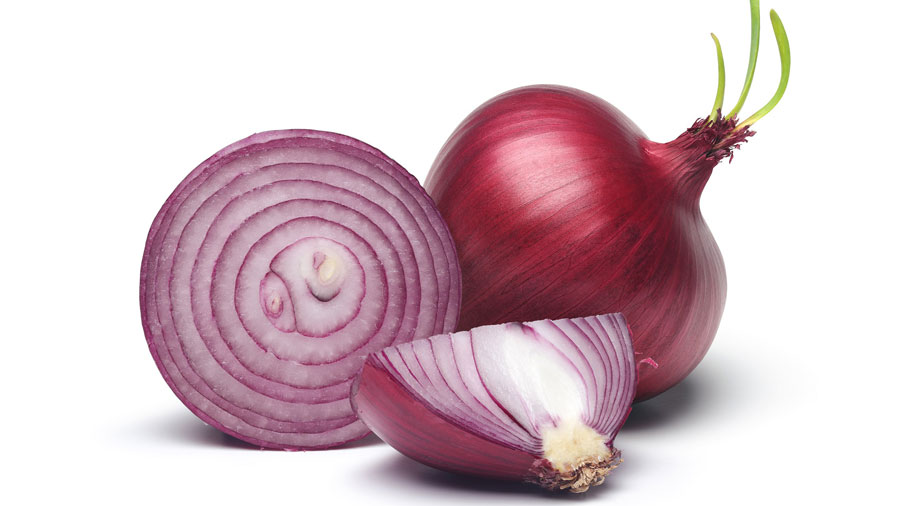
Onion
Onions: This pungent bulb vegetable is a staple in Indian kitchens, easily available and can come to your rescue, when you are struggling with thick mucus in your throat. It is a good source of quercetin — a flavonoid that has both antiviral and anti-inflammatory properties. Moreover, onions are also rich in vitamin C. The synergistic effect of quercetin and vitamin C can do wonders to fight off cough and cold. Make sure you have fresh, chopped onions. You can have it as a salad or add it to a sandwich or garnish your grilled chicken or fish with freshly cut onion rings.
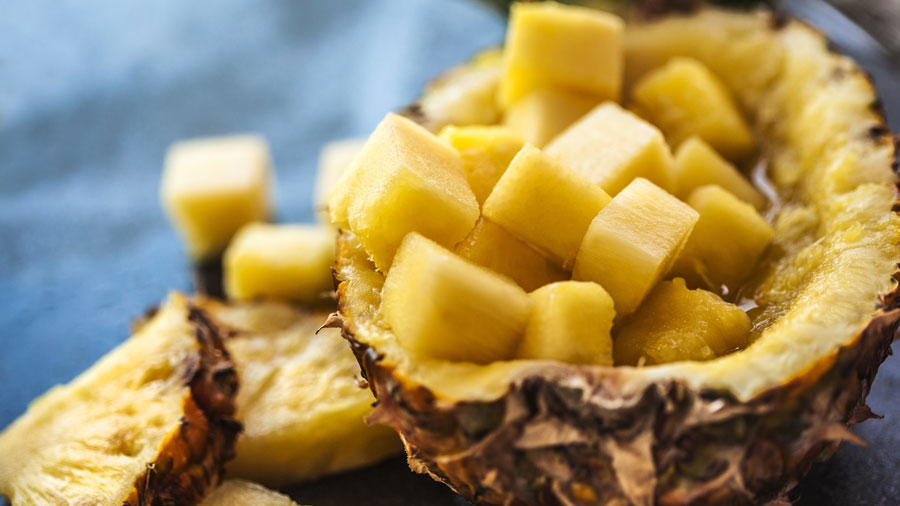
Pineapple
Pineapple: This tropical juicy fruit can be a saviour to help expel the irritating phlegm. It contains bromelain — a bioflavonoid which helps with respiratory congestion. Pineapple juice has mucolytic properties, which means it can help in thinning out the thick and sticky phlegm, making it easy for removal and ease out the stuffy feeling. It also has immune-boosting and anti-inflammatory properties. If pineapple is not in season, you can use canned ones or try packaged juice.
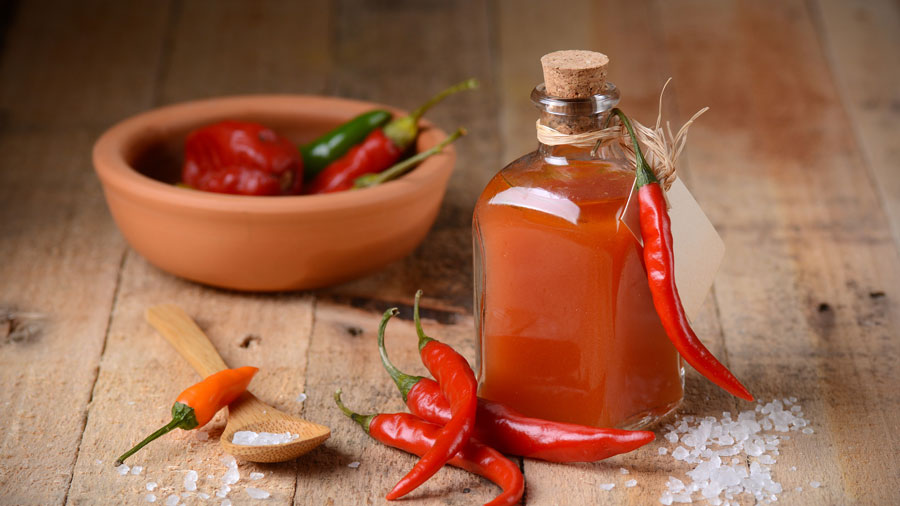
Tabasco sauce or chillies
Tabasco sauce: Most of us have experienced runny nose and watery eyes when we consume hot and spicy food. This can be attributed to the compound capsaicin, found in hot chillies. Capsaicin can reduce inflammation. It not only helps in releasing blocked mucus, which gives you the unceasing stuffy feeling, it thins out the mucous too. To reap in the double advantage of capsaicin, you can have tabasco sauce, coriander-mint-green chilli chutney or simply add some chopped green chillies to your food. Although mustard sauce does not contain capsaicin, it can come in handy; it’s as spicy and hot as tabasco. However, consume small amounts of these condiments because too much can irritate your throat and may lead to more mucus production.
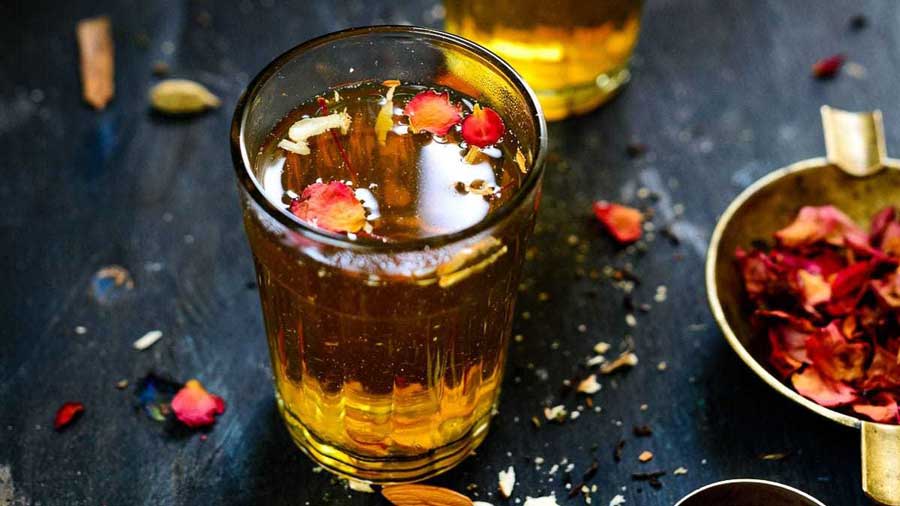
Kashmiri kahwa
Kashmiri kahwa: The aromatic concoction of spices — cinnamon, cloves, rose petals and the fragrant saffron can be a soothing remedy for cold and cough. The saffron in the kahwa provides the respiratory benefit owing it to its many bioactive compounds. It works like an expectorant, thereby helping in loosening phlegm from the throat and lungs, providing much-needed relief.
It is a storehouse of antioxidants. Crocin and picrocrocin, two of the several antioxidants found in saffron, have been reported to have anti-viral properties too. It also contains vitamins B and C, carotenoids, which can support immune function to fight off infections.
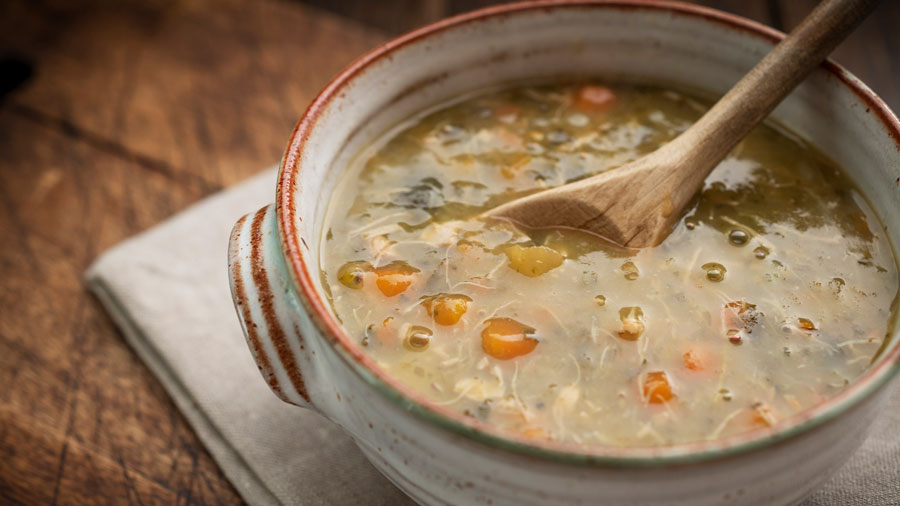
Chicken soup
Chicken soup: Slurp some chicken soup to kick out the virus. It has been reported that chicken soup is the most effective compared to any other warm liquid to relieve cold and congestion. This beneficial effect has been attributed to the presence of cysteine — an amino acid that loosens up blocked mucus and increases its flow, facilitating the removal of the infection-causing virus. Moreover, chicken also contains another compound called carnosine, which reduces inflammation in the upper respiratory tract, mitigating the nasal and throat congestion.
Don’t despair if you don’t eat chicken, any warm soup will help you with your congestion. Steam from the soup may open up your blocked nose and throat. Soups also provide the much-needed hydration to make the mucus thin. You can add ginger, garlic to amp up the anti-inflammatory effect of the soup.
Herbal teas: Like soups, herbal teas can be a great reliever. Heat helps to thin and push out the mucus from our bodies and so do the fluids. However, it’s encouraged to have herbal teas instead of regular ones because herbal teas are caffeine free. Caffeine is regarded as a dehydrating agent. That’s the last thing we want to be — dehydrated, when it comes to expelling mucus. Ginger, turmeric and peppermint teas can be great choices to get rid of congestion.
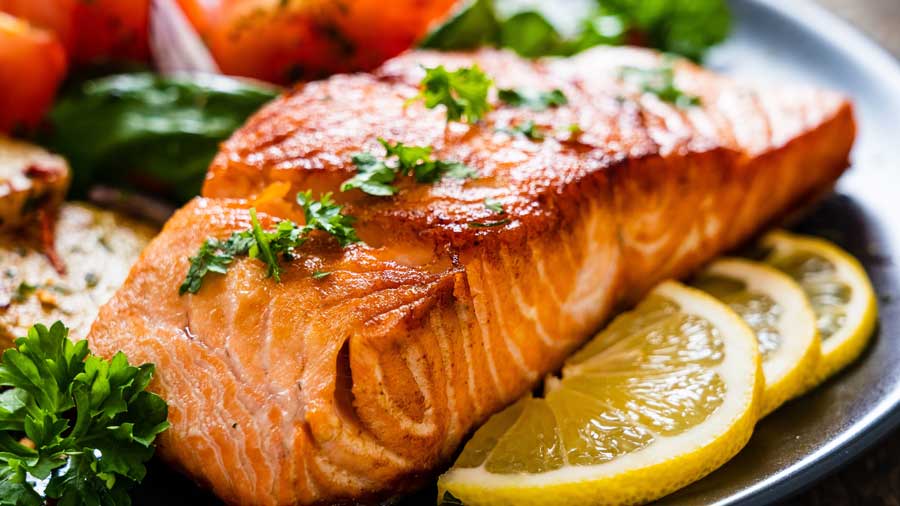
Salmon
Oily fish: Fish rich in oil containing omega-3 fatty acids can reduce mucus load as well as inflammation associated with any infection. It also helps strengthen your immune potential. Include pomfret, Indian mackerel, katla and salmon in your diet.

Things to consider
Avoid alcohol and caffeine: Both these substances can cause dehydration, which may dry out the lining of your nose and throat, making it difficult to clear congestion.
Avoid smoking: It can make your mucus thicker and stickier, making it difficult to expel. Nicotine found in cigarettes inhibits movement of the cilia or fibre-like cells that help move mucus out of your lungs. Moreover, inhaling smoke can irritate your throat and aggravate coughing.
Avoid or not avoid dairy? It’s commonly believed that milk and its products can make mucus thicker and aggravate congestion and dairy is best avoided if you are suffering from a respiratory condition. However, there is not much scientific evidence to substantiate this claim. Those who are diagnosed with milk allergy should completely avoid all forms of dairy while suffering from cold and flu.
Keep these handy
Expectorants, decongestants, saline nasal spray and humidifier. We do not know how many waves will come at us. All we can do is equip ourselves with a healthy lifestyle and a positive mindset until the pandemic loses steam.

Hena Nafis is a consultant nutritionist and the owner of nutrition and lifestyle clinic Nutrience, and the health cafe, Eat Good Food. You can follower her on Facebook and Instagram @nutriencebyhenanafis
